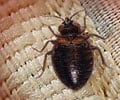Pentamidine Medication Information
Learn everything you need to know about Pentamidine-pronunciation, uses, dosage guidelines, indications, and when to take or avoid it.
Get up-to-date information on side effects, precautions, warnings, and proper storage to ensure safe usage.
Explore Pentamidine brand names commonly used in India and internationally, along with detailed pricing information. Consult your healthcare provider for tailored medical advice.
Generic Name : Pentamidine Pronunciation : pen tam' i deen ICD Code : Y41 Therapeutic Classification : Miscellaneous Anti- InfectivesBrand Names or Trade Names of Pentamidine
International :
Pentam, Nebupent
Why is Pentamidine Prescribed? (Indications)
This medication is an antimicrobial agent, prescribed for pneumonia and for treating leishmaniasis, yeast infections. This medication proved to be an effective antibiotic in children undergoing leukemia treatment.When should Pentamidine not be taken? (Contraindications)
Hypersensitivity.What is the dosage of Pentamidine?
IV/IM- The recommended dose is 4 mg/kg/day or on alternate days. Total: 7-10 doses.How should Pentamidine be taken?
It comes as a solution for injection, to be administered by a healthcare provider.What are the warnings and precautions for Pentamidine?
• Caution should be exercised in patients with history of asthma, smoking, decreased level of potassium, magnesium in blood, heart diseases, prolonged QT interval, diabetes, high/low blood pressure, high/low blood sugar, anemia, liver or kidney impairment during pregnancy and breastfeeding.• Monitor: Blood pressure, liver and kidney function, blood-glucose and serum-calcium concentrations and blood counts.
What are the side effects of Pentamidine?
Most Common- Vomiting, infection and loss of appetite.Body as a Whole - Night sweats, allergic reaction, body odor, swelling in the face/leg, fever, lethargy and chills.
Heart- Stroke, high/low blood pressure, palpitations, poor blood circulation, fainting, fast heart rate and dilatation of blood vessels.
Gastrointestinal- Diarrhea, nausea, abdominal cramps, abdominal pain, constipation, dry mouth, indigestion, inflammation of stomach/gum, gastric ulcer, hernia, increased saliva, oral ulcer/abscess and enlargement of the spleen.
Blood- Anemia, eosinophilia and decreased volume of blood cells.
Liver - Liver enlargement and liver dysfunction/inflammation.
Metabolic- Increased/decreased sugar level and decreased calcium concentration.
Musculoskeletal- Joint/muscle pain and gout.
Central Nervous System- Headache, anxiety, confusion, depression, drowsiness, frequent mood changes, hallucination, sensory loss, sleeplessness, memory loss, nerve pain, personality disorder, tingling, peripheral nerve damage, seizure, tremors and vertigo.
Genitourinary- Kidney damage and miscarriage.
Respiratory - Chest pain, cough, asthma, shortness of breath and wheezing.
Skin- Desquamation, dry and breaking hair, dry skin, redness, itching, rash and hives.
Eye and ENT- Bad taste, inflammation of eyelid, conjunctiva, blurred vision, contact lens discomfort, eye pain or discomfort, nonspecific odor and smell.








